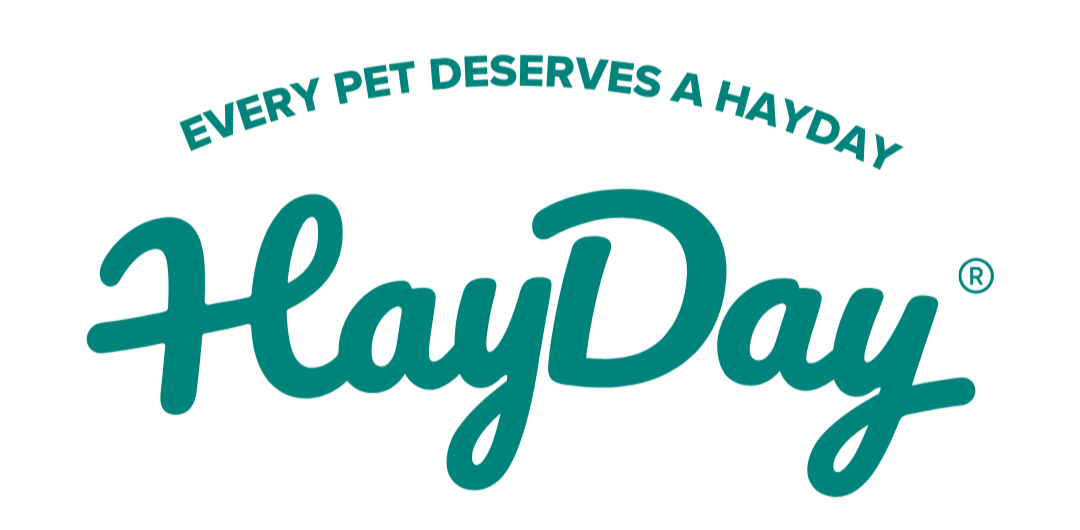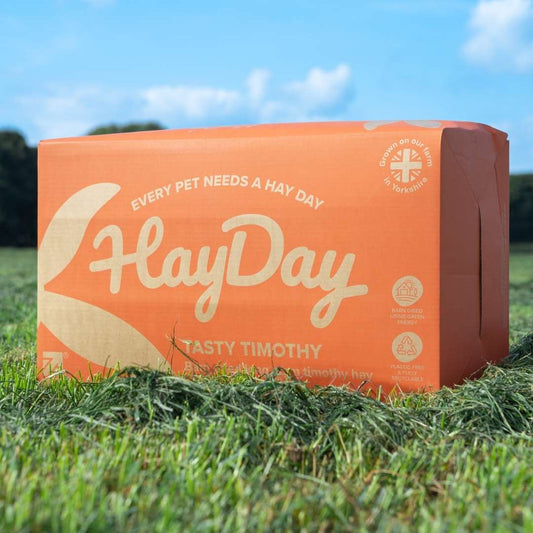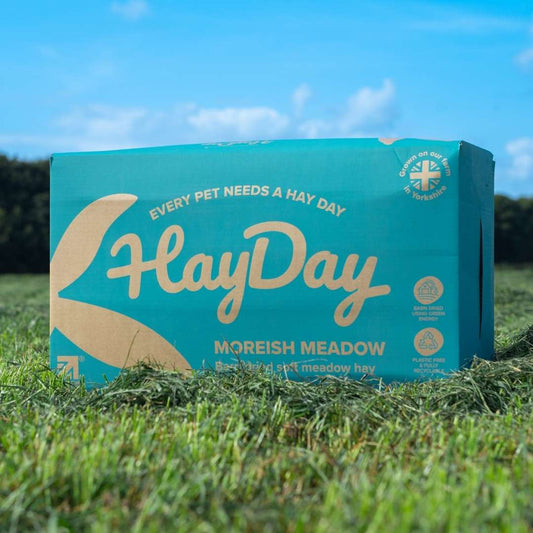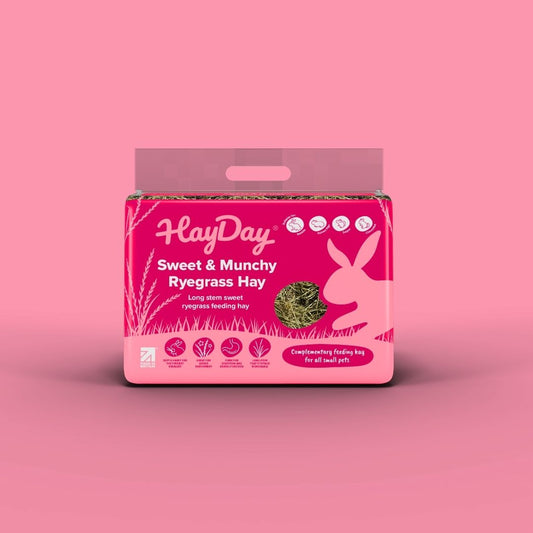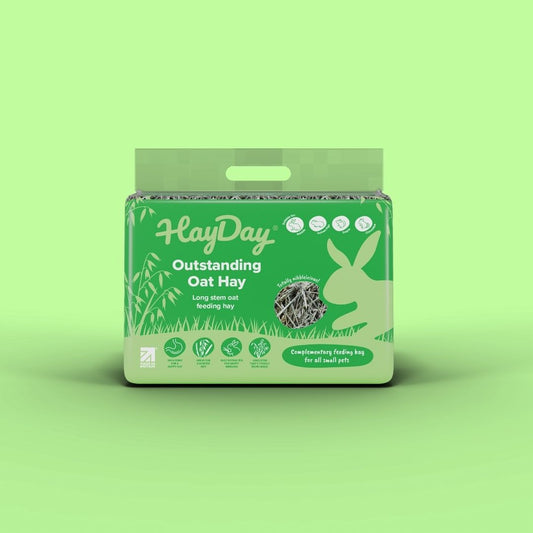Caring for rabbits as pets involves more than just providing love, food and water.
If you want to ensure your rabbit lives a long, happy, and healthy life, you’ll need to know key aspects of how to look after and care for rabbits.
In this rabbit care guide from HayDay, we’ll explore everything from creating the perfect home and diet to understanding their behaviour and health needs.
Whether you’re a new rabbit owner or looking to improve your bunny care routine - these top tips will help you provide the best care for your furry friend.
Shop Now > Premium, barn-dried and dust extracted hay for rabbits.
How to Care for a Rabbit - Overview
-
Provide a spacious and safe environment for new pet rabbits. As recommended by the Rabbit Welfare Association and Fund, ensure a minimum space of 3m long by 2m long based off average size rabbits.
-
A balanced diet primarily consisting of premium, dust extracted hay is crucial for a rabbit’s digestive health, supplemented with pellets and green, leafy veggies.
-
Regular veterinary care and understanding rabbit behaviour are essential for maintaining their health and building a strong bond with them.
Creating the Perfect Home for Your Pet Rabbit
A comfortable home is the foundation of good rabbit care. Pet rabbits need a secure and spacious environment, whether indoors or outdoors.
For indoor rabbits, options range from free-reign in a bunny-proofed room to a bunny apartment!
Outdoor rabbits can thrive in large, bunny proof sheds provided they are predator proof and sufficient enough to last, safely, throughout all seasons.
As recommended by the Rabbit Welfare Association who provide fantastic rabbit advice, all rabbits require a minimum of 3m by 2m of floor space with a height of at least 1m to hop around and move comfortably. It is also recommended to keep rabbits in pairs as they are sociable animals.
Maintaining a clean and dry environment by regular cleaning is essential for their health, especially for looking after house rabbits.
Bunny Proofing Your House
Bunny-proofing your house is necessary before bringing your new pet rabbit home.
These curious house pets love to chew, so protecting rabbits from household hazards is crucial. Covering cables and removing toxic plants are key steps in ensuring a safe environment. Electrical cords can be hazardous if chewed.
Blocking off areas under beds, sofas or bookshelves also contributes to a safer environment too.
The Importance of Fresh Hay
When it comes to how to care for a rabbit, ensuring that your rabbit consumes sufficient amounts of hay is crucial for a rabbit's diet and for their overall health. Hay provides essential nutrients, and boasts high fibre content which plays a vital role in maintaining healthy dental and digestive health.
To make sure your rabbit is eating enough hay, there are several important steps you can take:
-
First, focus on both the quantity and quality of hay. Always provide your rabbit with unlimited access to hay, at free choice.
-
Freshness is key, so regularly replace their hay to keep it appealing and free from spoilage. When choosing hay, opt for high-quality grass varieties such as Timothy Hay or Meadow Hay. These types are particularly beneficial for adult rabbits, as they are power houses in aiding their dental, digestive and gut health.
-
Encourage enrichment by presenting hay in fun ways! This can be achieved by placing hay within hay racks, hay feeders or by scatter feeding it throughout their environment.
Using Hay To Encourage Foraging
Encouraging your rabbit to consume more hay can be achieved through a few simple strategies to replicate their natural behaviour. Introducing a variety of hay types can keep your rabbit interested and prevent them from getting bored with their diet.
Other ideas include,
-
Placing a hay feeder in an easily accessible location within their enclosure can prompt more frequent feeding.
-
Scattering hay around the enclosure can stimulate your rabbit’s natural foraging instincts, turning mealtime into an enriching activity.
-
Interactive feeders like toys or racks can also make eating hay more engaging and enjoyable for your rabbit.
Keep Hay Fresh & Plenty Of It
It's essential to monitor your rabbit's hay to keep it fresh and for signs that they are consuming enough hay.
Regularly checking your rabbit’s teeth is essential, as overgrown or misaligned teeth can indicate that they aren't eating enough hay and potentially lead to dental problems. Additionally, healthy rabbits produce firm, golden poops regularly which indicates they are getting the fibre they need from their diet.
By implementing these tips, you can help ensure your rabbit receives the necessary nutrients and fibre from hay, supporting their overall well-being and health.
Balanced Diet for Rabbits
To keep your healthy rabbit healthy, a balanced rabbit diet is necessary.
Hay should dominate their diet, making up approximately 80% to 90% of their diet. Supplemented with fresh vegetables and rabbit-safe pellets.
Safe leafy greens include broccoli, cabbage, and kale, and fresh vegetables like romaine lettuce.
Always provide fresh water in a clean bowl, which they have unlimited access to.

Setting Up a Litter Tray
Litter training helps maintain a clean and hygienic environment for indoor rabbits. It's recommended to choose non-clumping, rabbit-safe litters like recycled paper or eco-friendly bedding. Adding hay to one end of a litter box, or having a hay rack close by, will encourage consistent use.
Enrichment and Exercise
Mental stimulation and physical activity are necessary for rabbits to thrive, similar to how they would in the wild. Enrichment prevents boredom, keeps them mentally engaged and not to mention - it encourages them to eat and forage more!
Grooming Your Rabbit
Regular grooming maintains your rabbit’s health. Weekly brushing helps manage shedding, especially during the summer months! Long-haired rabbits like Lionheads and Angoras need daily grooming to avoid matting.
You should also clip their nails every four to six weeks to prevent discomfort from overgrown nails.
For further grooming advice, you should contact your trusted vet.
Regular Veterinary Care
Regular veterinary care ensures your rabbit’s health. Annual wellness exams detect health issues early, preventing dental and digestive problems or unhappy bunnies.
Finding and using a trusted exotic veterinarian helps to address any health concerns if you are unsure.
Understanding Rabbit Behavior
Every rabbit is different, but understanding your rabbit’s behaviour improves care and strengthens your bond.
Rabbits communicate through ear positions and body language. An anxious rabbit may show tense muscles, a crouched posture, and flat ears against their back.
Recognising these signs helps you address their specific needs and provide a safe environment.
Essential Supplies Checklist
The right supplies are critical for optimal rabbit care. A high-quality hay supply, like Timothy Hay or Meadow Hay.
Medium-sized cat litter boxes are better than smaller ones for promoting good litter habits. Heavy ceramic bowls for water prevent tipping and keep your rabbit hydrated.
Summary
In summary, ensuring your rabbit’s well-being involves creating a safe and comfortable home, providing a balanced diet, and offering regular veterinary care.
From bunny-proofing your house to understanding your rabbit’s behaviour, each aspect of rabbit care is crucial for their health and happiness.
By following these guidelines, you’ll be well-equipped to meet your rabbit’s needs, leading to a very rewarding and joyful companionship.
Remember, a happy rabbit is a healthy rabbit, and your efforts will be rewarded with a loving and playful pet.
Relevant Links
How to Encourage Rabbits to Forage
Rabbit Welfare Association and Fund - Convert a Garden Shed
Rabbit Welfare Association and Fund - Housing Advice
Frequently Asked Questions
How much space does my rabbit need?
Your rabbit needs a minimum of 3m by 2m of floor space and at least 1m in height to ensure they can hop, stretch, and forage comfortably. Providing this space will promote their well-being and happiness.
What types of hay should I provide for my rabbit?
For your rabbit, it's best to provide unlimited Timothy Hay or Meadow Hay for adults and Alfalfa Hay is great for young rabbits (up to 6 months) to support their health and development.
How often should I groom my rabbit?
You should groom your rabbit at least once a week, while long-haired breeds like Lionheads and Angoras require daily brushing to prevent matting and manage shedding.
How can I prevent my rabbit from chewing on electrical cords?
To prevent your rabbit from chewing on electrical cords, use cord protectors or cover them with plastic sleeves, and elevate the cords 3-4 feet off the ground to keep them out of reach.
Implementing these measures will significantly reduce the risk of cord damage and help ensure your rabbit's safety.
